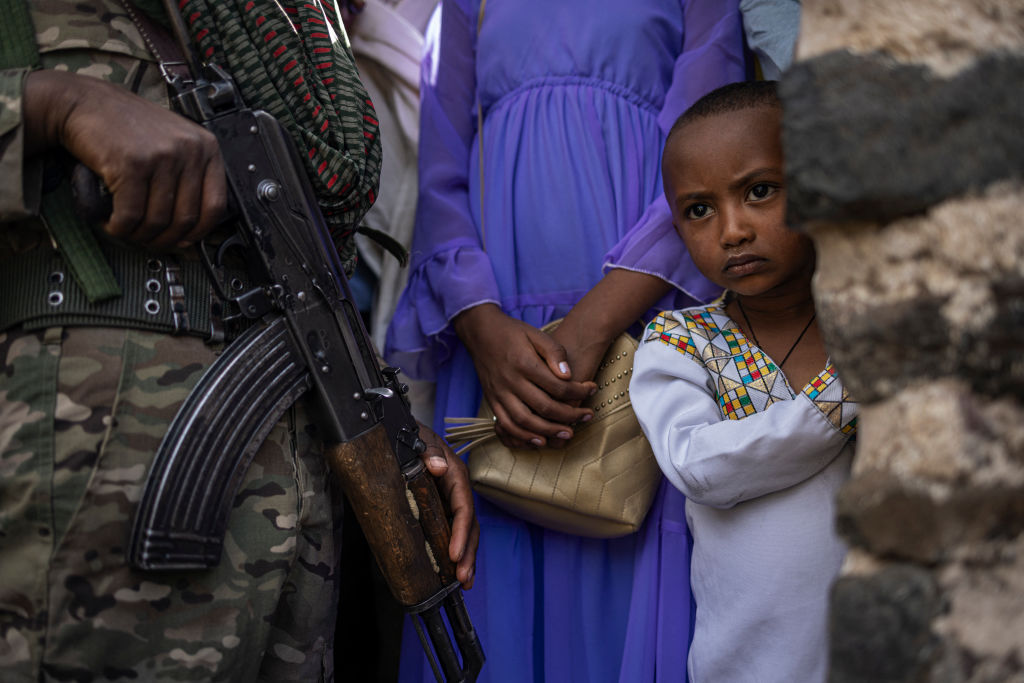ADF STAFF
A string of clashes in Ethiopia’s Amhara region between government forces and an ethnic militia are sparking fears of a widening war.
In September, fighting in the towns of Debark and Dabat in North Gondar left at least nine dead and 30 injured. During the same month, the ethnic Amhara militia known as the Fano briefly captured Gondar, a culturally important city that dates to the medieval era.
Both sides appear to be digging in for a prolonged conflict.
Speaking to a cheering crowd in Shewa, Gen. Tefera Mamo, a former Ethiopian military leader who joined the Fano this summer, said it has the upper hand and it is not time for negotiations. “Look at this armed struggle, see how much it has grown in just one year,” Tefera said, according to a transcript published by the Amhara Association of America. “There is no one that can stop us as we move forward.”
The Fano was formed in 2016 as a protest movement and later became an armed group claiming to protect Amhara land rights and other interests. During the 2020 to 2022 war in the Tigray region, Fano militia fought alongside federal government forces and reclaimed a disputed area known as Western Tigray. The Fano, as well as government and Tigrayan forces, were accused of widespread war crimes including brutal attacks against civilians.
Near the end of the conflict, the Ethiopian National Defense Forces (ENDF) began disarming and arresting Fano fighters and, in 2023, the Fano launched an insurgency against the government. In recent months, fighting has escalated. Fano militants launched nearly 70 attacks per month in July, August and September. That is more than double the rate of attacks in the first year of the insurgency. The group also claimed to have occupied 28 village areas known as woredas during the three months.
The ENDF announced on October 1 that it had launched a major military operation to defeat the Fano. “The only language they [armed rebel groups] understand is force. From now on we will talk to them in that language,” Ethiopian Army spokesperson Col. Getnet Adane told Voice of America. “For peace to prevail they need to be met with force. They have to be targeted, hit.”
But analysts caution that the Fano will be difficult to defeat because it is a coalition without a strict hierarchy or central command structure. It also enjoys widespread support from civilians in the region.
“Fano is a wide range of loosely aligned, decentralized Amhara militias, most of which are small and operate autonomously,” Liam Karr wrote for the Critical Threats Project. “These forces are highly effective despite their small size because they are well trained, as many members — including leadership — are former members of regional or federal armed forces and have extensive local support.”
The fighting is already having an impact on humanitarian aid. The United Nations is considering suspending its relief operations to the Amhara region after five aid workers were killed, 10 injured and 11 kidnapped in the first half of 2024, Reuters reported. More than 2.3 million people in the region rely on food aid for survival.
Observers are also fearful that the Amhara conflict has the potential to destabilize the entire country. The crisis is happening at the same time the Ethiopian federal government faces an uprising in the Oromo region as well as an ongoing effort to disarm and reintegrate fighters in the Tigray region.
“Could this be the conflict that ignites a wider civil war and leads to the country’s disintegration?” James Ker-Lindsay, a research associate at the London School of Economics who studies conflict and security, asked in a video blog. “The Amhara are the second largest group in the country. Any full-scale conflict in the region would undoubtedly have devastating consequences, not just in human terms, but also regarding the broader political impact.”

